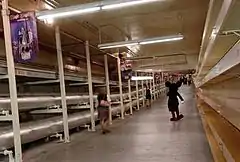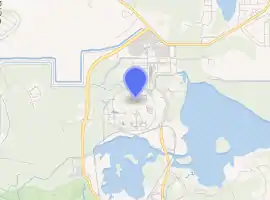Disney utilidor system
In Disney theme parks, the utilidor system is a system of some of the world's largest utility tunnels, mainly for Walt Disney World's Magic Kingdom in Florida. The utilidors, short for utility corridors, are a part of Disney's "backstage" (behind-the-scenes) area. They allow Disney employees ("cast members") to perform park support operations, such as trash removal, and for costumed characters to quickly reach their destinations on the surface out of the sight of guests to avoid ruining the illusion that is being created.
| Disney Utilidor System | |
|---|---|
 Disney Utilidor underneath the Magic Kingdom, with a cast member dressed as Mickey Mouse walking away from camera | |

| |
| Alternative names | Utilidors |
| General information | |
| Type | Tunnel System |
| Town or city | Bay Lake, Florida |
| Country | United States |
| Coordinates | 28.420965°N 81.581347°W |
| Owner | Walt Disney World |
| Height | |
| Roof | Magic Kingdom |
| Top floor | 107 feet (33 m) |
| Grounds | 9 acres (3.6 ha) |
These tunnels were first built for Magic Kingdom. Smaller utilidor systems are built under the central section of Epcot's Future World, primarily beneath Spaceship Earth and Innoventions, and formerly at Pleasure Island. Disneyland, in California, also has a small utilidor system running throughout Tomorrowland.
History
According to modern legend, Walt Disney was bothered by the sight of a cowboy walking through California Disneyland's Tomorrowland en route to his post in Frontierland.[1] He felt that such a sight was jarring, and detracted from the guest experience. Since the California Disneyland was small, such a tunnel system could not be feasibly implemented. When the new Florida Disney park was being planned, engineers designed utilidors to keep park operations out of guests' sight.
Magic Kingdom utilidor system
The largest system of utilidors is beneath Walt Disney World's Magic Kingdom, but they are not a basement. Because of an elevated water table, most of these tunnels were actually built at ground level, and the Magic Kingdom was built above that. All the guests of the park see streets that are elevated by one story. Parts of Fantasyland, including the Cinderella Castle, are at third-story-level. The ground's incline is so gradual that guests tend not to realize they are ascending to the second and third stories. The Magic Kingdom is built upon soil which was removed from what is now the Seven Seas Lagoon.
The utilidors are built on 9 acres (36,000 m2), and the floor plan is a circle with a path down the middle; the tunnel walls are color-coded to make it simple for cast members to determine their location. The utilidors can be accessed from a main tunnel entrance located behind Fantasyland, or through unmarked doors throughout the Magic Kingdom. Magic Kingdom cast members park about 1 mile (1.6 km) away and are transported via a Disney bus to the tunnel. Some shops, restaurants and attractions have direct access to the utilidors.[2]
Cast members navigate the tunnels on foot or in battery-powered vehicles that resemble golf carts. Gasoline-powered vehicles are not allowed in the utilidors, with the exception of armored cash pickup trucks and, in extreme emergencies, ambulances.[3]
Guests are not allowed in the utilidors, unless they join the Keys to the Kingdom tour.[3]
Functions
The utilidors have been referred to as an "underground city", the functions of which include:[2]
- Waste removal: The Magic Kingdom uses an automated vacuum collection (AVAC) system for waste removal. Custodians remove trash from the park twenty-four hours a day, then dump it into AVAC system processors throughout the park. The trash then travels through pneumatic tubes to a central location where it is processed and compressed for transfer to a landfill or recycling plant.[2][4]
- Electrical operations: The park's computer system, the Digital Animation Control Systems (DACS), is operated and monitored from control rooms in the utilidors. This system monitors everything in the park, from sound systems to attractions, Audio-Animatronic figures to parades, fire prevention and security systems to cash registers.[2]
- Deliveries and storage warehouses: Deliveries are received, processed, and stored at the utilidors until use. This ensures that guests do not see delivery trucks, nor do they see cast members carting merchandise through the park.[2]
- Food service: The park's cooking and prep kitchens are housed in the utilidors.[2]
- Costuming: For years, the park's costuming department (for cast members and Audio-Animatronic figures) was located in the utilidors. Over 1.2 million costumes were housed here, making it the largest operating wardrobe department in the world. In 2005, Disney replaced this facility with a larger location in the cast member parking lot. The only costuming operations that remain in the utilidors today are for costumed characters.[2]
- Cast member services: Separate locker rooms for men and women are located in the utilidors, as well as cast member cafeterias. There is also a check cashing service, an employee hair salon called "Kingdom Kutters," rehearsal rooms, and administrative offices.[2]
- Emergency services: Two medical carts are housed in the utilidors and are deployed whenever there is a medical emergency in Magic Kingdom.[2]
References
- "Betcha Didn't Know (World View) by Mark Goldhaber on September 11, 2003". Mouseplanet.com. 2003-09-11. Retrieved 2010-06-07.
- Sim, Nick (2014-04-14). "15 Things That are Hidden Underground at Disney's Magic Kingdom". Theme Park Tourist. Retrieved 2015-09-10.
- Below It All: Utilidors Of The Magic Kingdom, Walt DIsney World for Grown-Ups, published 2014-02-01.
- "Fun Facts of Magic Kingdom's Underground Complex". Hiddenmickeys.org. Retrieved 2010-06-07.